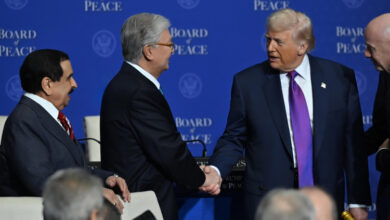
The Council of Heads of State of the Commonwealth of Independent States (CIS) convened its latest meeting under the leadership of Sadyr Zhaparov, the President of the Kyrgyz Republic. The summit, which witnessed the presence of several heads of state from CIS member nations, unfolded in two distinct formats and produced substantial outcomes.
In a more private setting, the leaders engaged in discussions surrounding the pressing challenges faced within the framework of the CIS. The meeting culminated in the decision that the Russian Federation will assume the presidency of the CIS in 2024. Furthermore, it was agreed that the next gathering of the Council of Heads of State of the CIS will transpire in Moscow on October 8, 2024.
The broader session of the heads of state commenced with the presentation of the Honorary Medal of the Commonwealth of Independent States. The esteemed award was conferred upon President Shavkat Mirziyoyev of Uzbekistan in recognition of his contributions to the development of the CIS, the enhancement of camaraderie, regional cooperation, and mutual benefit among member states.
Subsequently, the summit participants engaged in deliberations regarding the establishment of the International Organization for the Russian Language. This initiative seeks to fortify the bonds of friendship, neighborliness, mutual understanding, and mutually beneficial collaboration among nations. It specifically aims to promote the Russian language as a vehicle for international communication, access to global knowledge bases encompassing culture, literature, history, and bolstering its status as an official or working language within international and regional intergovernmental organizations.
During the course of the meeting, the Council of Heads of State of the CIS adopted four statements. First, the statement on cooperation in the realm of digitalization in public administration endeavors to intensify cooperation among CIS member states in the domain of digital transformation in the public sector. This initiative aims to enhance the efficiency of public service delivery, ensure information security, and regulate the digital sphere in a way that upholds human rights in the era of digitization.
The second statement emphasizes international relations in a multipolar world. It underscores the importance of forging a stable multipolar global order and the commitment of CIS member states to contribute to the establishment of a secure international relations framework. The statement promotes the CIS region as a space of peace, cooperation, sustainable development, and shared prosperity. It affirms the CIS’s openness to extensive international collaboration in accordance with international law, taking into consideration mutual interests and shared approaches.
The third declaration focuses on the protection of human and citizen rights and freedom of religion. It highlights the significance of comprehending religious and cultural diversity within CIS member states and encourages dialogue and cooperation in matters related to religious freedom and citizenship. The document particularly emphasizes the value of education, including citizenship and religious tolerance.
The final statement affirms support for and the promotion of the Russian language as a language of international communication. It underscores the Russian language’s role in the world as one of the official languages of the United Nations and numerous other international bodies. The document underscores the need to preserve and popularize the unique linguistic, historical, and cultural heritage of CIS member states and its pivotal role in enhancing the common cultural and humanitarian sphere within the CIS. Furthermore, it underscores the commitment to using the Russian language in mutual interactions and at international organizations and forums, while categorically rejecting discrimination based on language.
It is stipulated that all the statements ratified during the Bishkek meeting will be disseminated to the United Nations and other international entities.
Several agreements reached at the Council of Heads of State pertain to security cooperation, including the Agreement on the Formation of the International Center for Assessing the Risks of Legalizing Criminal Proceeds and Financing Terrorism, the Agreement on the Formation of the Coordination Council in the Field of Forensic Expert Activity, and the Interstate Program of Joint Measures to Combat Crime in 2024-2028.



